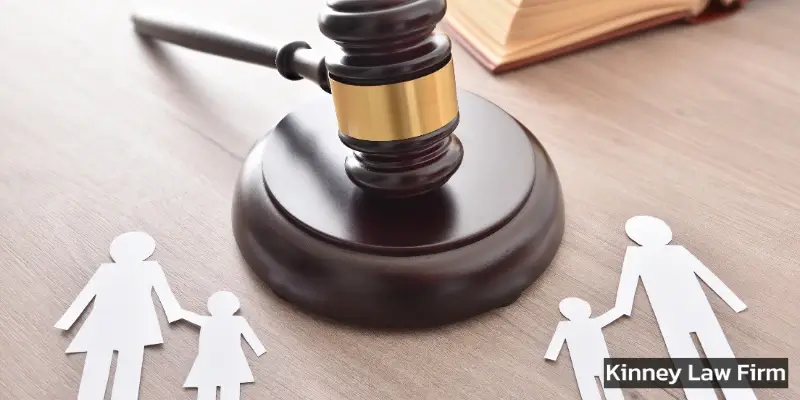Manning Child Support Lawyer
Manning Child Support Attorney
Child support is an important part of establishing new family dynamics after divorce. It can be a legally and emotionally complex process, as it requires the good faith of all parties to work in the interest of the children involved. At Kinney Law Firm, our talented Manning child support lawyer can assist in navigating the complexities of family law to find an equitable and fair arrangement.

Child Support Obligations
Child support is not an uncommon arrangement in family structures. A 2021 study in Manning found there were 2.4 divorces per 1,000 people in the city. Child support is a series of financial payments from a non-custodial or higher-earning parent to the custodial or lower-earning parent. These are made to support a minor child until they either turn eighteen or graduate from high school. The specifics of this obligation can be reached either through mutual agreement between the parents or a court order from the Clarendon County Family Court.
Once child support obligations have been created, they are enforceable. If the receiving spouse has issues with the other parent fulfilling the court order, they can notify the court and seek enforcement actions.
How Child Support Is Determined in South Carolina
The South Carolina child support system follows what is known as an “income shares” model. This approach takes into account several factors, such as:
- Income proportionality
- Custody arrangements
- Extraordinary expenses, like healthcare
This system seeks an equilibrium between parents by taking into consideration the various abilities of a parent to pay for the support and the needs of the child.
While each case is different, if both parents have comparable incomes, then child support payments will generally be low. There may even be no child support if both parents have roughly equal income and joint custody. However, if there is a vast difference in earning power between the two, child support payments from the higher-income parent will be higher. Beyond salary and wages considered, income from sources like rental properties, social security payments, and retirement funds is taken into account.
Child Support Enforcement
It is important to understand that violations of a child support order are taken seriously. Failure to make payments or imputed (manipulated) income can have consequences. A violation of this law is a criminal misdemeanor, and convicted offender face fines and up to 6 months in prison. In South Carolina, missed payments are considered a violation of a child’s rights, and the courts have several avenues of recourse to enforce payments.
Such legal recourse includes fines, garnished wages, and even jail time. There is no statute of limitations on child support payments in arrears. Only in rare cases will payments in arrears be forgiven; this may occur if the other parent requests the court to waive a portion of them.
How a Lawyer Can Help
The counsel of a skilled attorney can be helpful in many ways. A lawyer can assist in finding mutual ground between parents to decide on a child support plan out of court. Often, such a process can be emotional, and a lawyer can be an objective third party who can offer solutions that serve the interest of the child.
Should an agreement fail to be reached, an experienced child support lawyer can represent their client in courtroom proceedings, advise them on the ideal approach, and defend their interests. When filing for a child support order, a lawyer can submit the petition with all the necessary information, calculate the sought payment, and make sure the payments are enforced after a court order has been granted.
The importance of an attorney does not end once a child support arrangement has been made. Occasionally, payments may need to change due to economic hardship or other extenuating circumstances. A lawyer can collect relevant evidence and organize a submission to support these claims.
At Kinney Law Firm, we have been helping the people of South Carolina address their legal concerns for years. With a strong record of success, our team has assisted our clients across a wide range of legal issues, including child support litigation. Allow our Manning child support lawyers to help you today.

FAQs
Q: Is It Worth Getting a Lawyer for Child Support?
A: Generally, it is greatly helpful to have a lawyer for child support cases. While each case is different, an attorney can navigate the complex process of litigation. They can also work on tasks like establishing paternity, obtaining child support orders, and making sure those orders are enforced. Child support cases can be emotional, so having legal counsel as an outside party can allow parents to focus on what is right for their child.
Q: What State Is the Hardest on Child Support?
A: What state is the “hardest” on child support depends on the criteria. Some states have higher averages of required payments. In Massachusetts and Nevada, for example, the median monthly payments were around $1,150, while the average in South Carolina is $760. Enforcement in states can vary, and some are harsher than others. In many states, failure to make child support payments can result in garnished wages, fines, and even jail time. The Census Bureau’s Current Population Survey (CPS) Child Support Supplement (CSS) collects detailed information about child support agreements and awards, including both required payments and amounts actually received, as well as data about the socioeconomic characteristics of custodial parents and their families.
Q: Can You Write Off Lawyer Fees for Child Support?
A: In general, South Carolina follows the federal precedent that legal fees for child support cannot be written off from one’s taxes. There are some areas where legal counsel is considered a legitimate write-off, such as in cases regarding tax disputes or where they are incurred while operating a business. However, for child support cases, they are considered a personal expense.
Q: What Is It Called When You Can’t Afford a Lawyer?
A: If you are unable to afford a lawyer in South Carolina, your position is known as “in forma pauperis.” This means you are indigent and require assistance in obtaining legal aid. Once you have filed the proper paperwork showing your indigent status, you may be eligible for pro bono counsel or legal aid programs that are designed to help in such situations.
Speak With an Experienced Manning Child Support Lawyer Today
In South Carolina, nearly one in four children is affected by the child support system. It is an important part of establishing equitable family support after divorce, so it deserves to be handled by diligent professionals. At Kinney Law Firm, whether you are seeking to negotiate with your spouse, file a court order, or litigate a payment plan, our experienced attorneys can protect your interests.
Contact us today to find out what we can do for you.


